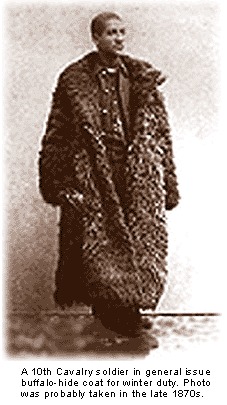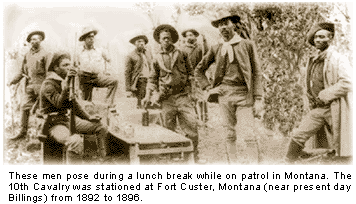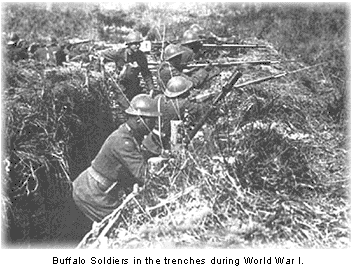On June 28, 1866 two U.S. Army African American regiments were formed, the 9th and 10th cavalries. Members of those units and two all-black infantry regiments, the 24th and 25th, came to be called Buffalo Soldiers. By 1867, the four regiments were consolidated into the 9th and 10th cavalry units, and all were sent to the West to (among many other duties) fight Indians and protect settlers, cattle herds, and railroad crews.
 These unsung heroes were commanded by such white officers as Benjamin Grierson, and sometimes by an African-American officer, such as Henry O. Flipper. These men took on jobs that no one else in the army wanted, and prevailed as a close-knit brotherhood of American soldiers throughout hazardous and unforgiving territories of the Wild West.
Call of duty
African Americans have been fighting in military conflicts since colonial days. The Buffalo Soldiers comprised former slaves, freemen and United States Colored Troops of the Civil War.
More than 180,000 African-Americans served in the Union Army during the Civil War. More than 33,000 of those soldiers died in the conflict. Following the war, the future of African Americans in the U.S. Army was uncertain.
As the post-Civil War Westward movement began to unfold, the Buffalo Soldiers conducted campaigns against American Indian tribes on a western frontier that extended from Montana in the Northwest to Texas, New Mexico, and Arizona in the Southwest.
Great warriors
Throughout the era of the Indian Wars, approximately 20 percent of the U.S. Cavalry troopers were African American, and they fought more than 177 engagements. Native Americans named them Buffalo soldiers because their hair resembled buffalo hair. Buffalo Soldiers wore the nickname with pride and valor. The Spanish referred to them as “Smoked Yankees."
These unsung heroes were commanded by such white officers as Benjamin Grierson, and sometimes by an African-American officer, such as Henry O. Flipper. These men took on jobs that no one else in the army wanted, and prevailed as a close-knit brotherhood of American soldiers throughout hazardous and unforgiving territories of the Wild West.
Call of duty
African Americans have been fighting in military conflicts since colonial days. The Buffalo Soldiers comprised former slaves, freemen and United States Colored Troops of the Civil War.
More than 180,000 African-Americans served in the Union Army during the Civil War. More than 33,000 of those soldiers died in the conflict. Following the war, the future of African Americans in the U.S. Army was uncertain.
As the post-Civil War Westward movement began to unfold, the Buffalo Soldiers conducted campaigns against American Indian tribes on a western frontier that extended from Montana in the Northwest to Texas, New Mexico, and Arizona in the Southwest.
Great warriors
Throughout the era of the Indian Wars, approximately 20 percent of the U.S. Cavalry troopers were African American, and they fought more than 177 engagements. Native Americans named them Buffalo soldiers because their hair resembled buffalo hair. Buffalo Soldiers wore the nickname with pride and valor. The Spanish referred to them as “Smoked Yankees."
 While subduing Native Americans, Mexican revolutionaries, outlaws, comancheros, and rustlers, the brave men of the 9th and 10th Cavalry gained little respect from the rest of the army, all while they delivered an invaluable service.
The Buffalo Soldiers endured and prevailed over some of the most treacherous and inhospitable terrain in North America. The men had their hands full as they went up against such hostile icons as Geronimo, Billy the Kid, Pancho Villa, and Sitting Bull.
More than just a fighting unit
The Buffalo Soldiers explored and mapped vast areas of the southwest and stretched hundreds of miles of telegraph lines. They built and repaired frontier outposts around which future towns and cities bloomed to life. Without the protection provided by the 9th and 10th cavalries, crews building the ever-expanding railroads lay at the mercy of outlaws and hostile Indians.
The Buffalo Soldiers consistently received some of the worst assignments the Army handed out. They also faced fierce prejudice against both the color of their Union uniforms and their skin, by many of the citizens of the post-war frontier towns.
Residents of the former Confederate state of Texas felt great animosity towards the black soldiers because they thought that the U.S. government was punishing them directly with the Emancipation Proclamation. Furthermore, most judicial systems lent a tainted hand to black soldiers that became entangled with other white citizens.
Despite this, the soldiers of the 9th and 10th cavalries developed into two of the most distinguished fighting units in the Army.
While subduing Native Americans, Mexican revolutionaries, outlaws, comancheros, and rustlers, the brave men of the 9th and 10th Cavalry gained little respect from the rest of the army, all while they delivered an invaluable service.
The Buffalo Soldiers endured and prevailed over some of the most treacherous and inhospitable terrain in North America. The men had their hands full as they went up against such hostile icons as Geronimo, Billy the Kid, Pancho Villa, and Sitting Bull.
More than just a fighting unit
The Buffalo Soldiers explored and mapped vast areas of the southwest and stretched hundreds of miles of telegraph lines. They built and repaired frontier outposts around which future towns and cities bloomed to life. Without the protection provided by the 9th and 10th cavalries, crews building the ever-expanding railroads lay at the mercy of outlaws and hostile Indians.
The Buffalo Soldiers consistently received some of the worst assignments the Army handed out. They also faced fierce prejudice against both the color of their Union uniforms and their skin, by many of the citizens of the post-war frontier towns.
Residents of the former Confederate state of Texas felt great animosity towards the black soldiers because they thought that the U.S. government was punishing them directly with the Emancipation Proclamation. Furthermore, most judicial systems lent a tainted hand to black soldiers that became entangled with other white citizens.
Despite this, the soldiers of the 9th and 10th cavalries developed into two of the most distinguished fighting units in the Army.
 Honor and respect
Buffalo Soldiers participated in many other military conflicts: The Spanish American War, The Philippine Insurrection, the Mexican War, World War I, World War II, and the Korean War.
In the 1950s, Buffalo Soldier regiments were disbanded when all military services were integrated.
In 1992, Joint Chiefs of Staff chairman Colin Powell dedicated a memorial to the Buffalo Soldiers at Fort Leavenworth, Kansas, the birthplace of one of the regiments. It was a fitting tribute from a military that once hesitated to accept African Americans, but eventually learned to respect and depend upon them.
Honor and respect
Buffalo Soldiers participated in many other military conflicts: The Spanish American War, The Philippine Insurrection, the Mexican War, World War I, World War II, and the Korean War.
In the 1950s, Buffalo Soldier regiments were disbanded when all military services were integrated.
In 1992, Joint Chiefs of Staff chairman Colin Powell dedicated a memorial to the Buffalo Soldiers at Fort Leavenworth, Kansas, the birthplace of one of the regiments. It was a fitting tribute from a military that once hesitated to accept African Americans, but eventually learned to respect and depend upon them.